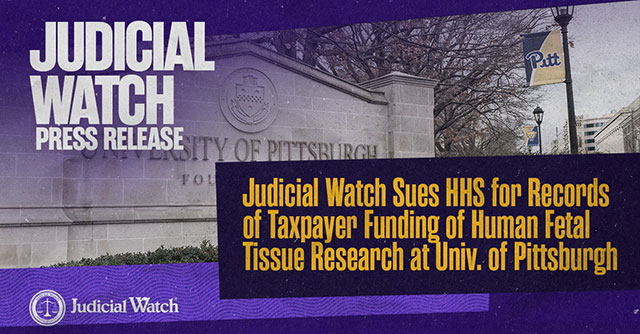
Judicial Watch Joins Allied Educational Foundation in Supreme Court Civil Asset Forfeiture Amicus Brief

‘Freedom from unlawful conversion of property is an inherent individual liberty right which the Constitution must secure for all citizens’
(Washington, DC) — Judicial Watch announced today that it joined with Allied Educational Foundation (AEF) in filing an amicus curiae brief in the United States Supreme Court supporting petitioner Tyson Timbs against the State of Indiana, which Judicial Watch contends abused its power in a civil asset forfeiture case (Tyson Timbs, et. al. v. State of Indiana (No. 17-1091)) The case was heard by the Supreme Court this week.
In May of 2013, Tyson Timbs was arrested and pled guilty to a charge of drug dealing and conspiracy. He received a six-year sentence (with five years suspended) and a $1,200 fine.
Earlier in the year, Timbs had received a $70,000 life-insurance payment after his father passed away. He used $42,000 of it to purchase a Land Rover car. Timbs used the Land Rover to deliver $225 worth of drugs, the report said. The state seized the car under a state policy which allows private lawyers to sue for a forfeiture in order to receive a cut.
The car was worth four times the amount of the maximum possible fine ($10,000) in the Timbs case. Lower courts in Indiana ruled the penalty was grossly disproportional under the Eighth Amendment. The Indiana State Supreme Court reversed the lower courts’ ruling.
In their brief, Judicial Watch and AEF express concern that “the Indiana Supreme Court’s ruling, if allowed to stand, will allow state and local government abuses of forfeiture laws to continue,” adding that “freedom from unlawful conversion of property is an inherent individual liberty right which the Constitution must secure for all citizens.”
Judicial Watch and AEF also noted that “The Eighth Amendment ‘excessive fines’ clause must serve as a check against state forfeiture laws. Many state and local governments abuse their powers to seize citizens’ property on the barest of pretense to raise revenue without having to raise taxes. When the amount the government can take is limited only by the size of a citizen’s bank account, the Courts must apply special scrutiny to prevent corrupt practices. The Eighth Amendment was designed to limit these kinds of easily-abused punitive laws, and it applies to the states via the Privileges or Immunities clause of the Fourteenth Amendment.”
National Review reported an abundance of “abusive seizures justified under civil forfeiture. One family had its home taken because the son was caught with $40 of drugs. In Texas, a family that drove for too long in the left lane of the highway was told by a county district attorney that their children would be put in foster care, the parents would be put in jail, and their car would be seized unless they handed over all of their cash, in which case they would be free to go. The town where that occurred, Tenaha, prides itself on this tactic, which ensures a steady flow of cash and goods from out-of-town drivers.”
Supreme Court Justice Clarence Thomas has long spoken out on the practice of civil forfeiture. In a case last year, Leonard v. Texas, which the Supreme Court refused to hear, Thomas wrote in a dissenting opinion: “This system – where police can seize property with limited judicial oversight and retain it for their own use – has led to egregious and well-chronicled abuses…. These forfeiture operations frequently target the poor and other groups least able to defend their interests in forfeiture proceedings. Perversely, these same groups are often the most burdened by forfeiture. They are more likely to use cash than alternative forms of payment, like credit cards, which may be less susceptible to forfeiture. And they are more likely to suffer in their daily lives while they litigate for the return of a critical item of property, such as a car or a home.”
As Judicial Watch and AEF contend “Occasionally, the abuse takes the form of governments using forfeiture laws to fill their coffers instead of raising taxes.”
Judicial Watch and AEF pointed to the December 9, 2014, testimony by Judicial Watch President Tom Fitton before the New York State Assembly:
The New York Police Department has broad authority to seize currency and property whenever an arrest is made. Because seized assets are used to fund the NYPD’s pension fund and other law enforcement purposes, the system creates a perverse incentive. According to a recent analysis, in 85 percent of NYPD forfeiture cases, the owner of the seized property is never charged with a crime.
They also cited Lee v. Minner (2006): “The inherent right of U.S. citizens to be free from excessive financial penalties is not one held exclusively against the federal government. It is therefore proper that the Eighth Amendment be applied to state and local governments, because the ability to live free or unjust government financial penalties both ‘plays an important role in furthering a vital national economy’ as well as ‘vindicates individual and societal rights.’”
“The Supreme Court should stop an egregious abuse of civil forfeiture laws in which state and local governments fill their coffers by seizing the property of citizens,” said Judicial Watch President Tom Fitton.
The Allied Educational Foundation is a charitable and educational foundation dedicated to improving the quality of life through education. In furtherance of that goal, the Foundation has engaged in a number of projects, which include, but are not limited to, educational and health conferences domestically and abroad. AEF has partnered frequently with Judicial Watch to fight government and judicial corruption and to promote a return to ethics and morality in the nation’s public life.
###

















